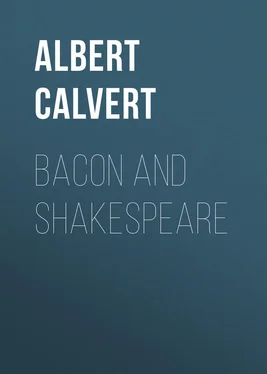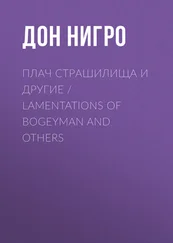Albert Calvert - Bacon and Shakespeare
Здесь есть возможность читать онлайн «Albert Calvert - Bacon and Shakespeare» — ознакомительный отрывок электронной книги совершенно бесплатно, а после прочтения отрывка купить полную версию. В некоторых случаях можно слушать аудио, скачать через торрент в формате fb2 и присутствует краткое содержание. Жанр: foreign_antique, foreign_prose, на английском языке. Описание произведения, (предисловие) а так же отзывы посетителей доступны на портале библиотеки ЛибКат.
- Название:Bacon and Shakespeare
- Автор:
- Жанр:
- Год:неизвестен
- ISBN:нет данных
- Рейтинг книги:5 / 5. Голосов: 1
-
Избранное:Добавить в избранное
- Отзывы:
-
Ваша оценка:
- 100
- 1
- 2
- 3
- 4
- 5
Bacon and Shakespeare: краткое содержание, описание и аннотация
Предлагаем к чтению аннотацию, описание, краткое содержание или предисловие (зависит от того, что написал сам автор книги «Bacon and Shakespeare»). Если вы не нашли необходимую информацию о книге — напишите в комментариях, мы постараемся отыскать её.
Bacon and Shakespeare — читать онлайн ознакомительный отрывок
Ниже представлен текст книги, разбитый по страницам. Система сохранения места последней прочитанной страницы, позволяет с удобством читать онлайн бесплатно книгу «Bacon and Shakespeare», без необходимости каждый раз заново искать на чём Вы остановились. Поставьте закладку, и сможете в любой момент перейти на страницу, на которой закончили чтение.
Интервал:
Закладка:
On the accession of James I., Bacon again threw himself into the political arena, determined to neglect no chance of ingratiating himself with the new Sovereign. He poured forth letters to any and everybody who had the power to forward his cause. He dwelt in these epistles upon the services of his brother Anthony, who had carried on secret and intimate negotiations with Scotland. Sir Thomas Challoner, the confirmed friend of Essex, received a letter from him; he appealed to the Earl of Northumberland; and became the “humble and much devoted” servant of Lord Southampton, on the eve of that nobleman’s release from the Tower (where Bacon had helped to place him as an accomplice of Essex). To each he turned with the same request that they would bury the axe, and “further his Majesty’s good conceit and inclination towards me.”
At this time, Bacon, desperately apprehensive of rebuff, was anxious to conciliate all parties, and to secure friends at Court. He was willing, nay, eager, to be Greek, Roman, or Hebrew, in order to attain his object – even he would avow a gift of poesy to make his calling and election sure. Writing to Sir John Davies, the poet, Bacon, the politician and philosopher, who did not publish two lines of rhyme until twenty-one years later, desired him to “be good to concealed poets.” Reading this statement in connection with the other epistles he indicted at the same crisis, we realise how little dependence can be placed upon the implied confession that he had written anonymous poetry. His letters to Southampton, to Michael Hickes (Cecil’s confidential man), to David Foules and Sir Thomas Challoner, and to the King himself, all betray the same feverish desire to be all things to all men. He assured Hickes that Lord Cecil is “the person in the State” whom he “loves most,” and at the same moment he placed his whole services at the disposal of Cecil’s rival, the Earl of Northumberland! When the star of Northumberland began to pale, Bacon importuned Cecil to procure him a knighthood to gratify the ambition of an “Alderman’s daughter, a handsome maiden,” whom he had found “to my liking.” But for a while Bacon found the struggle for recognition unavailing. The King found him an acquired taste – or rather a taste that his Majesty had yet to acquire – and after grovelling to all and sundry, he desisted at the moment from the attempt to gain the King’s grace, “because he had completely failed, and for no other reason.”
But although Bacon went into retirement, he divided his leisure between his literary labours and his quest for political advancement. In all his political pamphlets, his one ambition was to divine and reflect the Royal views. In 1590 he had nothing but condemnation for the Nonconformist party; in 1604 he had strenuously pleaded the cause of Nonconformity; in 1616 he as strenuously opposed the slightest concession being made to the Nonconformers. In 1604 he was returned to Parliament; three years later, his zeal in anticipating the King’s wishes, and supporting his proposals, was rewarded by his appointment to the Solicitor-Generalship. In the following year he was made clerk of the Star Chamber, and immediately set himself to secure the displacement of Hobart, the Attorney-General.
Bacon’s conduct towards the Earl of Essex has already been considered. Had this been the only instance of the kind in his career, his apologists would have achieved something more than public opinion can grant them in their endeavours to explain it away. But his behaviour towards Cecil is another lurid illustration of his duplicity and ingratitude. During the last fourteen years of his life Cecil had been the friend and patron of Bacon, whose letters to him are couched in almost passionate terms of loyalty and “entire devotion.” In one epistle he declares himself “empty of matter,” but “out of the fulness of my love,” he writes to express “my continual and incessant love for you, thirsting for your return.” Cecil was his refuge and deliverer in 1598, and again in 1603, when he was arrested for debt, and Bacon was not empty of reason when he asserted in another letter, “I write to myself in regard to my love to you, you being as near to me in heart’s blood as in blood of descent.” In 1611, a short while before Cecil’s death, he wrote this last profession of his affection: —
“I do protest before God, without compliment, that if I knew in what course of life to do you best service, I would take it, and make my thoughts, which now fly to many pieces, be reduced to that centre.”
In May of 1612 Cecil died. Within a week Bacon had proffered his services to the King in the place of his cousin, of whom he wrote: —
“He (Cecil) was a fit man to keep things from growing worse, but no very fit man to reduce things to be much better; for he loved to keep the eyes of all Israel a little too much upon himself.”
To another, he wrote that Cecil “had a good method, if his means had been upright,” and again to the King, on the same subject: —
“To have your wants, and necessities in particular, as it were hanged up in two tablets before the eyes of your Lords and Commons, to be talked of for four months together; to stir a number of projects and then blast them, and leave your Majesty nothing but the scandal of them; to pretend even carriage between your Majesty’s rights and the ease of the people, and to satisfy neither – these courses, and others the like, I hope, are gone with the deviser of them.”
Less than a year before, Bacon had protested before God, “without compliment,” his desire to serve Cecil, and now he protests to God in this letter to the King, that when he noted “your zeal to deliver the Majesty of God from the vain and indign comprehension of heresy and degenerate philosophy … perculsit ilico animum that God would shortly set upon you some visible favour; and let me not live if I thought not of the taking away of that man” – the man as “near to me in heart’s blood as in the blood of descent.”
The King, who had grown weary of Cecil, may have accepted his death as a visible favour of God, but the favour did not evidently embrace the substitution of Bacon in his cousin’s stead. His application for the vacant post of Lord Treasurer was passed over by the King, but Bacon became Attorney-General in the following year.
Bacon as the Creature of Buckingham
Let us regard another trait in the character of this many-sided statesman. To relieve the King’s pressing necessities it was proposed that voluntary contributions should be made by the well-affected. The contributions, commonly known as Benevolences, were rarely voluntary; the “moral pressure” that was employed in their collection made them in reality extortions, and, as such, they were the cause of national dissatisfaction. During the search of the house of a clergyman named Peacham, consequent on some ecclesiastical charge, a sermon was found predicting an uprising of the people against this oppressive tax, and foretelling that the King might die like Ananias or Nabal. The sermon had neither been issued nor uttered, but the unfortunate rector, a very old man, was indicted for conspiracy and, in contravention of the law, put to the torture. Peacham had not been convicted of treason, though Bacon “hopes that the end will be good;” or, in other words, that he will be able to wring from the condemned man a confession to make good the charge.
The wretched old clergyman, after being examined in Bacon’s presence, “before torture, in torture, between torture, and after torture,” could not be made to convict himself, and Bacon’s comment to the King is that the man’s “raging devil seemeth to be turned into a dumb devil.” It will be noted that this infamous act of illegality and Bacon’s commentary are the deed and words of the man who is supposed by some to have declared,
Читать дальшеИнтервал:
Закладка:
Похожие книги на «Bacon and Shakespeare»
Представляем Вашему вниманию похожие книги на «Bacon and Shakespeare» списком для выбора. Мы отобрали схожую по названию и смыслу литературу в надежде предоставить читателям больше вариантов отыскать новые, интересные, ещё непрочитанные произведения.
Обсуждение, отзывы о книге «Bacon and Shakespeare» и просто собственные мнения читателей. Оставьте ваши комментарии, напишите, что Вы думаете о произведении, его смысле или главных героях. Укажите что конкретно понравилось, а что нет, и почему Вы так считаете.












